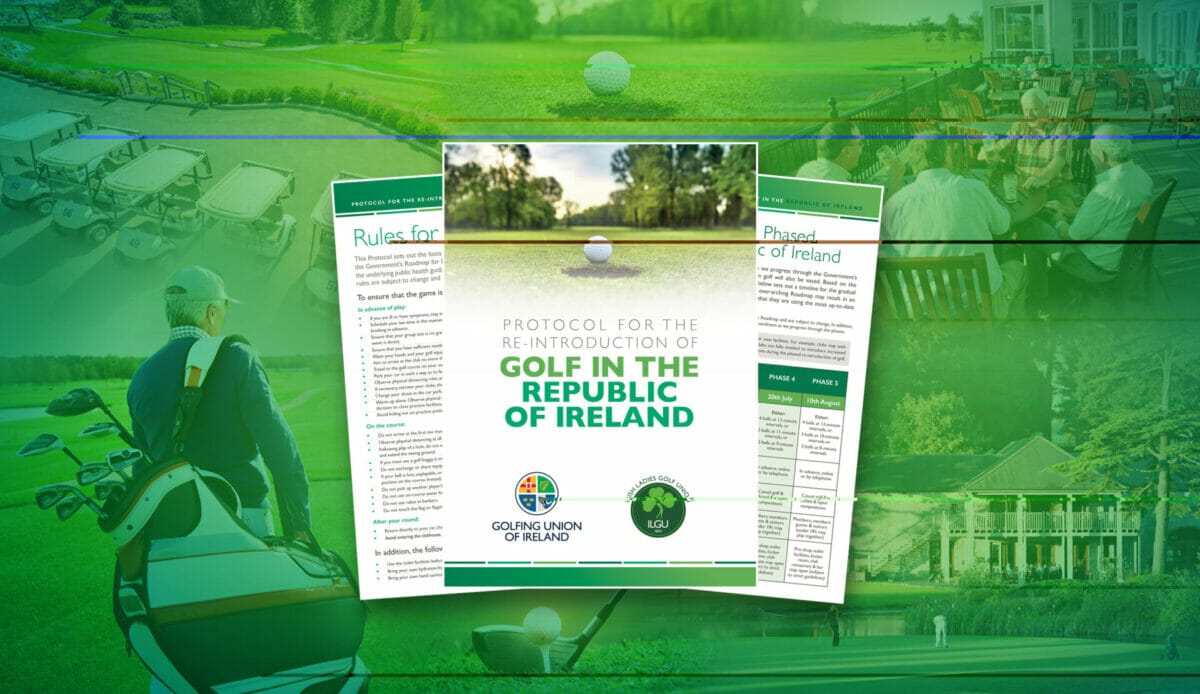It was the green light the sport had been waiting for since sirens blasted over fairways across Ireland on March 24th because of Covid-19. An industry that had been hibernating for most of the winter was forced into an extended slumber but phase one of the lifting of Government restrictions has offered golf a much-needed lifeline as summer nears.
Golf has been granted permission to reopen on Monday, May 18th but for members only initially and Government travel restrictions of 5-kilometres for non-essential journeys will apply. Golf does not fall under the list of essential journeys.
The limitations such directives place on rural golf clubs in particular will likely mean some courses remain closed until travel restrictions extend to 20 kilometres from June 8th, but the question is whether clubs can survive in the meantime.
Just this month, Waterrock Golf Club in Cork notified both its men’s and ladies’ clubs that it would not reopen after the current restrictions are lifted. Waterrock became the fourth course to close in recent weeks after Kerry’s Castleisland and Killorglin, and Offaly’s Castle Barna, and the severity of the current crisis means more clubs will likely follow.
“I think financially for a lot of clubs – every club is down in income –but even the clubs with pretty full memberships are going to suffer,” said John McCormack, President of the Irish Golf & Club Managers Association.
“They have no competition income, no bar income, no food income, no green fee income and that’s a big hit for any club.”
It’s understandable given the financial strain many clubs are under that the 5-kilometre restriction has been the major talking point surrounding golf’s return. The GUI and ILGU’s joint set of protocols by which golfers must abide to ensure the sport can one day return to normal post-Covid-19 made no mention of the directive, but the Golfing Union of Ireland has since clarified, that “The Government travel restrictions apply to the whole of society, golfers included.”
That means courses like PGA National Ireland Slieve Russell in County Cavan and Rosses Point in County Sligo, whose membership living within the 5-kilometre radius sits between 10-20%, have to weigh up whether or not the costs of running the club during this time of severe restriction is worth reopening at all. That will certainly be a question for championship links courses on Ireland’s edges like Carne, Rosapenna and Connemara where membership numbers qualifying to play on the 18th equates to almost nil.
“I’ve heard talk that some clubs were thinking that way but I’m not aware of any club not reopening on Monday,” admitted McCormack. “There’s 400 clubs in Ireland but I haven’t heard of any club specifically not opening, that isn’t to say there isn’t one.”
In the usually bustling seaside town of Rosses Point, scenes aren’t quite post-apocalyptic but golf’s return on May 18th, however restricted, is still a welcomed boost to the local economy.
“Approximately 20% of our membership (120 golfers) live within 5km so it’s not too bad,” said David O’Donovan, General Manager at County Sligo GC. However, there’s no escaping that golf’s return under its current limitations is like sticking a plaster on a gunshot wound.
“I’m not only looking at an empty golf course and clubhouse, but an empty town at Rosses Point,” O’Donovan highlighted. “All the hotels are closed, restaurants are closed, it would usually be extremely busy at this time and the incremental economic fallout from this will be huge. Not just for the golf club, but for this small local economy.”
At Slieve Russell, on the fairways where Ireland’s famous golfing twins, Leona and Lisa Maguire learned their craft, PGA Professional Gordon Smyth paints a slightly different picture.
“Every club is different but as quite a rural club, we only have approximately 50 members who are within the 5km travel radius. The course will be open and ready for them but as a resort the hotel will be closed and our other facilities outside the golf course will not be available,” Smyth said.
A warning to golfers outside the 5km radius
The game’s governing bodies in Ireland have stressed restrictions that may have been eased could be re-imposed by Government at short notice, meaning golf courses could close again should the return to play protocols not be followed by golf clubs and golfers over the coming weeks.
Ultimately, it will be up to the golfer and not the golf club to police the 5-kilometre restriction and that has been the general response from club managers around the country who have said they will be relying on their members to follow HSE guidelines, rather than taking on the responsibility of enforcing such measures from May 18th.
“That’s the law of the land and people have to obey the law,” said McCormack.
“It will be up to the individual, as it has been for many weeks now but people have behaved sensibly to this point, not just in golf but in life in the ‘new normal’, so I’d be confident the sport can lead by example.”
Golf finds itself in a privileged position as one of the first sports to be given the go ahead by Government to resume but the honour comes with great responsibility. Although the sport naturally promotes social distancing and supports mental health, the ever-changing face of Covid-19 means a second wave of the pandemic cannot be ruled out.
“Everybody has weighed in behind the protocols, they do see a sense of responsibility for the entire industry to behave responsibly and hopefully we can move through the phases then to the benefit of everybody,” added McCormack, who is also the General Manager of Castle Golf Club in Dublin.
Ireland’s lifting of restrictions has been carefully calculated and consistent and the decreasing numbers of Covid-19 cases and victims points to a system that is working. The UK’s response has been quite the opposite with Prime Minister Boris Johnson widely criticised for his apparent easing of a lockdown that didn’t exist with his vague public address on May 10th.
Johnson surprisingly confirmed that golf clubs could reopen on May 13th, giving courses just a three-day turnaround to be golf ready. What he failed to mention, however was the specifics for all four UK nations with England Golf later clarifying that play would resume in England, before Wales Golf confirmed they would be joining Ireland’s restart date of May 18th. Scottish Golf and golf in Northern Ireland remain closed for now.
Absence makes the heart grow fonder
It’s not all doom and gloom as returning golfers have come out in force in response to tee-sheets reopening around the country. Stackstown Golf Club, home to three-time Major winner Padraig Harrington, saw slots book up almost instantly with players reserving places as late as 8.13pm for an overdue hit on May 18th, while clubs have also reported an increase in membership enquiries from local golfers hoping to qualify for an overdue game while restrictions ease.
“We’ve seen a small increase in membership enquiries, eight this week, which wouldn’t be normal at this time of year and these are from people who had left to pursue other sports so golf right now has a great opportunity to get these people back into the game,” commented O’Donovan.
Still, there’s no escaping the financial consequences this pandemic will have on the golf industry as a whole. Professional tour schedules have been decimated while continuing travel restrictions mean Ireland, as a premier golf tourism destination and home to almost one third of the world’s links courses, will suffer a hammer blow.
“Overseas business would account for over 55% of our annual income here and it’s gone completely,” added O’Donovan of Co Sligo GC. “I appreciate that there are clubs like Ballybunion and Lahinch etc. that are worse hit than us, but for a club of our size in our area, this overseas business is vital and it just won’t be happening this year.”
Far from an exclusively Irish problem, the global impact of Covid-19 means the sun-baked fairways of Spain, Portugal and beyond, almost wholly reliant on visitor green fees, will be left to count untold costs this year. Travelling overseas for leisure purposes in 2020 is looking increasingly unlikely but Peter Walton, CEO of the International Association of Golf Tour Operators is confident the wider industry can recover.
“While golf tourism is not immune to global or regional crises – be they economic, security, environmental or health by nature – a downturn in visitor arrivals often goes hand in hand with a tightening of belts, [but] we have seen over the past two decades that golf travel bounces back quicker than most other tourism industry sectors once the risk or fear has run its course.”
How golf clubs and golfers alike conduct their business over the next number of weeks will greatly determine this recovery. If the Government sees the need to renege and close courses again, the impact could be catastrophic for clubs at the mercy of an already depleted season. An appetite amongst the golfing public for staycations across Ireland should soften the blow but it will be August before many can plan such adventures and even then, those dreams hinge on what we do in the meantime.
“Golf is back,” McCormack says, optimistically. “We’re very conscience that we’re the guinea pigs to prove to Government that things can happen safely but hopefully other sports can follow suit and give Government the confidence to allow other industries to come in off the back of it.”
























Leave a comment